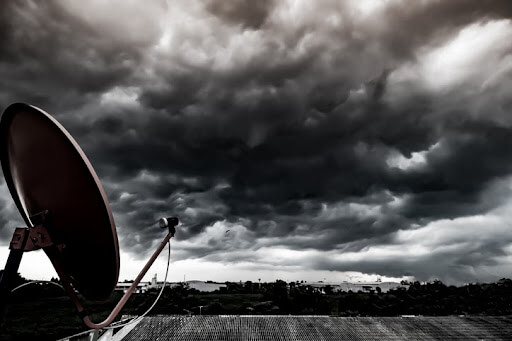
Is satellite internet affected by weather? If you use satellite internet for business communications, you may have already experienced outages due to inclement weather. However, when it comes to satellite internet and sub-optimal weather conditions, you may need to take additional steps to ensure steady connectivity.
Weather Conditions That Could Affect Your Satellite Connectivity
Satellite internet connections use radio frequencies that travel in straight paths and cannot penetrate solid objects. Because weather affects the air between the dish and the satellite, satellite internet and weather have a complicated relationship. In addition to weakening or disrupting the signal, weather can also damage the satellite dish itself.
Rain
Although your satellite internet connection should not be affected by light rains, the signal may be too weak if the dish is not aligned correctly to the satellite. To get a reliable connection, make sure you align the satellite dish to a peak signal.
The impact of rain fade on your satellite internet connection depends on the frequency band the satellite uses. Higher-frequency bands are usually more affected by rainfall because the wavelength is close in size to water molecules. Although longer wavelengths are less affected by rain fade, they cannot carry as much data.
Heavy rains and thunderstorms can completely block a satellite signal. Your signal can be disrupted even if it isn’t raining in your area, as the signal might pass through a distant storm. If you are located in a tropical location with seasonal thunderstorms, weather studies can help you predict outage times and plan ahead.
Snow
Snow can also disrupt your satellite internet service, typically by piling up on a satellite dish and blocking the signal. Light, dry powdery snow usually doesn’t impact your internet, but heavy snow can pose a problem.
Snow can also result in condensation that builds on the surface of a dish, and impacted snow can form an ice layer that blocks the signal long after a snowstorm has passed. If your business is in an area with snowy weather, you should check your satellite dish as a regular maintenance duty after a snowstorm.
Some satellite dish manufacturers have developed heated dishes that melt snow and ice to ensure a stable connection. These dishes have a built-in thermostat that switches on the electric heater when the temperature drops below a certain threshold. However, if you don’t want to switch to a heated satellite dish, you can manually remove snow and ice from your satellite dish once it is safe to do so.
Wind
Satellite internet and weather conditions can be tricky to navigate, especially because of the satellite internet dish itself. Satellite dishes are solid and have a parabolic shape, which means that strong winds can bend it, disrupting your internet service. The tower supporting a satellite dish might also sway in the wind, distorting the signal and causing temporary outages.
What is more concerning is severe storms like tornadoes and hurricanes. Both can rip a satellite dish completely off its mount, resulting in extended service outages until it can be repaired or replaced. Many satellite dish manufacturers can add reinforced mounting hardware to your installation if your facilities are in an area with high winds.
Do you have a Disaster Recovery Plan (DRP) checklist?
Obstructions Caused by Weather
Obstructions like fallen trees can also disrupt your satellite internet service. After a storm, make sure to survey the area for fallen trees or other solid objects that might block your satellite internet signal.
In tropical areas, some trees can grow up to 30 quite quickly, blocking what used to be a clear path for your satellite dish. In addition, you might experience service disruptions in areas with seasonal weather, when bare trees grow leaves in the spring and summer. Therefore, it is essential to consider these variables when installing your satellite dish to ensure you don’t lose connection for part of the year.
How to Maintain Satellite Connectivity In Bad Weather
Satellite internet is a powerful solution, especially for businesses operating in remote areas. However, inclement weather like strong winds, heavy rain, or snow can pose challenges and potentially disrupt your internet connection, affecting its quality and reliability.
At IP Access International, we understand the importance of staying connected no matter the weather. Dependable internet connections are ensured with our innovative SuperGIG™ technology. SuperGIG™ allows you to access satellite, cellular, and FirstNet networks seamlessly, enabling a stable and consistent internet connection in any weather conditions.
Say goodbye to manual carrier monitoring and switching – our SuperGIG™ technology automatically sources alternative mobile internet connections to keep you connected without interruptions.
If you’re interested in learning more about how SuperGIG™ can support your connectivity needs, contact us today!